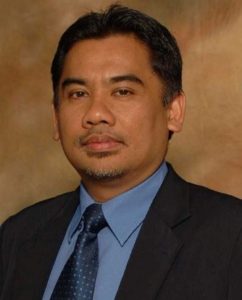Keynote Speaker

Prof. Dr. Ahmad Faris Ismail
Prof. Dr. Ahmad Faris Ismail is the Deputy Rector (Academic and Internationalisation) and the Co-Chair of the UNESCO Chair in Future Studies at the International Islamic University Malaysia (IIUM). He obtained his B.Sc. in Chemical Engineering in 1988, from the University of Houston, Texas, USA, and a Ph.D in Engineering from Rice University, Texas, USA, in 1993. He was the IIUM Deputy Rector (Research and Innovation) from July 2009 until June 2013. He served as the Dean of Engineering from 1997 until 2009 and from 2019 until 2020. He was also the Co-chairman of the Malaysian Council of Engineering Deans from 2007-2009. He obtained his B.Sc. in Chemical Engineering in 1988, from the University of Houston, Texas, USA, and Ph.D in Engineering from Rice University, Texas, USA, in 1993.
Prof. Ismail received the Federation of the Universities of the Islamic World’s Tribute – ‘Personality Having Contributed to the Development of Islamic University Education’ in 2008. He was a Visiting Academic at the University of Southern Queensland from January until June 2014. In 2004, he was a Visiting Scientist at the Graduate School of Engineering, Kyoto University, Japan. He is also the Chief Editor of the IIUM Engineering Journal. He has been serving as a member of the evaluation committee for the Fundamental Research Grant Scheme, HiCoE Scheme, and the Science Fund since 2006. He served as an IDB (Islamic Development Bank) Consultant for the Development of Mussa Bin Bique University, Mozambique Master Plan in August 2003 and he also served as an IDB Consultant for the Development of an Islamic University in Afghanistan in 2018.
He has been invited as keynote speakers for various conferences and congresses in Jordan, Morocco, Indonesia, Uganda, Saudi Arabia, Sudan, Bangladesh, Syria, Iran, Turkey, Pakistan, India, Sweden and Malaysia. He has conducted workshops on “Outcome-based Education (OBE)”, “Academic Self-Assessment” and “Strategic Plan and Balanced Scorecard”, and he has also been delivering lectures on “Invention and Innovation”, “Curriculum Planning and Management”, “Professional Ethics”, “Towards Outcome-based Education”, “CFD and Nanofluids”, and “Research Design and Instrumentation.”
Prof. Ismail is also a co-inventor for at least eight filed patents of research products at the university and has published more than 200 papers in refereed journals and conference proceedings. His research topics include energy and environment, computational fluid dynamics, combustion, and nanofluids. He has been actively involved in several research projects worth more than RM2 million and a few of his products such as a solar still and the heat transfer enhancement using nanofluids have won international awards.
Synopsis
Development of Stable Nanofluids for Heat Transfer Enhancement Applications
Nanofluids with their enhanced thermal conductivity are believed to be a promising coolant in various heat transfer applications. Both experimental work and numerical simulations were carried out to determine the heat transfer enhancement for different types of nanofluids including CNT-Nanofluids, ironoxide nanofluids, and metal-metaloxide-carbon based ternary hybrid nanofluids. For the CNT-Nanofluids, the concentrations of CNT were varied from 0.01 wt% to 0.1 wt%. The stability of nanofluids is measured in terms of its concentration as a function of sediment time using UV-Vis Spectrophotometer. The thermal conductivity of the nanofluids is measured using KD-2 Pro thermal conductivity meter. CFD (Computational Fluid Dynamics) simulations were also carried out to further study the heat transfer enhancement in heat exchangers. Thermal conductivity, density and rheology of the nanofluids were also measured as a function of temperature. The results showed high increase in the thermal conductivity and nearly 70% enhancement in heat transfer with increase in flow rate. Numerical results exhibited good agreement with the experimental results with deviation of about 3.0%. Corrosion effects of CNT-Nanofluids on three different metals, the aluminium alloy, stainless steel and copper, were also investigated.
